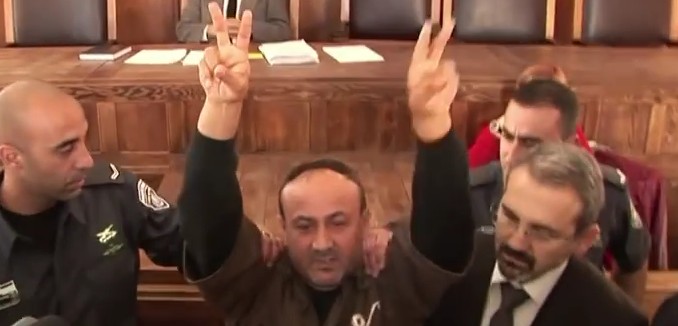According to a poll released today by the Palestinian Center for Public Opinion (PCPO), Marwan Barghouti, currently serving five life sentences in an Israeli prison for his conviction in terrorist murders, would be “the most favorite candidate for next presidential elections.”
The polling pitted hypothetical candidates from Fatah and Hamas, the two most prominent Palestinian political parties, with Barghouti favored in every head-to-head matchup. In defiance of its commitments to the United States and in disregard of the peace process with Israel, Fatah agreed to a unity government with Hamas last month, and the two parties are expected to call for elections to determine the ultimate makeup of the government.
According to the published results of the poll (Microsoft Word), Barghouti would outpoll Fatah’s Mahmoud Abbas by a margin of 33.2 percent to 26.9 percent; Hamas’s Ismail Haniyeh by 49.7 percent to 16.0 percent; and Hamas’s Khaled Meshaal by 51.0 percent to 16.2 percent. The poll has a three percent margin of error.
Barghouti, a long time aide to the late Palestinian leader Yasser Arafat, was the head of Tanzim, a group founded in 1995 to be the “armed wing of Fatah,” then under the direct control of Arafat. In 2000, according to Palestinian Authority official, Jibril Rajoub, Barghouti was tapped to found the Al Aqsa Martyrs Brigade at the outset of the second intifada.
Barghouti was arrested in 2002 for his participation in the violence of the second intifada and was convicted two years later on five counts of murder. While Barghouti challenged the authority of the court, Judge Zvi Gurfinkel ruled that he was being tried according to principles of international law, noting:
Within the conspiracy to commit Acts of Terror and with the intention of promoting this conspiracy, the Defendant and his subordinates carried out a series of actions that caused, promoted and enabled the implementation of the Acts of Terror.
The Defendant, who led, managed and operated the Acts of Terror, was aware of the activity of the Field Commanders and their subordinated Terror Activists, and was updated with regard to their activity, both directly and indirectly, as in the case of the attack on the Sea Food Market restaurant in Tel Aviv, to be detailed below.
In the Sea Food Market attack, a terrorist, at the behest of Barghouti, arrived “armed with an M-16 rifle, grenades and a knife” at the restaurant “completely packed with dozens of diners.” The terrorist sprayed the restaurant with bullets and threw grenades into the crowd. The grenades did not explode, but the terrorist killed three people, police officer Salim Barakat, Eli Dahan and Yosef Habi, who died protecting his injured wife.
Barghouti was also convicted of planing the murder of Greek Orthodox monk Father Georgios Tsibouktzakis in 2001. In January 2002, Yoela Chen was murdered and her aunt injured on their way to a family wedding by a terrorist sent by Barghouti. Although Barghouti was only convicted of complicity in these five murders, he was indicted for his involvement in 37 terror attacks.
In 2002, while he was a fugitive, The Washington Post published an op-ed by Barghouti (reprinted in Al Ahram) in which he wrote:
And while I, and the Fatah movement to which I belong, strongly oppose attacks and the targeting of civilians inside Israel, our future neighbour, I reserve the right to protect myself, to resist the Israeli occupation of my country and to fight for my freedom.
The Jerusalem Center for Public Affairs noted that Barghouti only explicitly rejected violence against Israelis within the 1967 border, though his general call “to resist” and the Tel Aviv attack suggest that he didn’t limit his support of terror to territories under dispute.
In 2012, Barghouti issued a similar call to “resistance” as Haaretz reported:
Barghouti, who was arrested by Israeli commandos in Ramallah in 2002, was one of the initiators of the second intifada. He called on Palestinians to combine popular resistance with diplomatic actions.
“It must be understood that there is no partner for peace in Israel when the settlements have doubled,” Barghouti said. “It is the Palestinian people’s right to oppose the occupation in all means, and the resistance must be focused on the 1967 territories.”
Though Barghouti is often touted as a future Palestinian leader who could make peace with Israel, he is a convicted killer who remains committed to “resistance”—a code word for terror. Barghouti’s popularity suggests an endorsement of his methods and rhetoric by the Palestinian people.
[Photo: AFP news agency / YouTube ]




